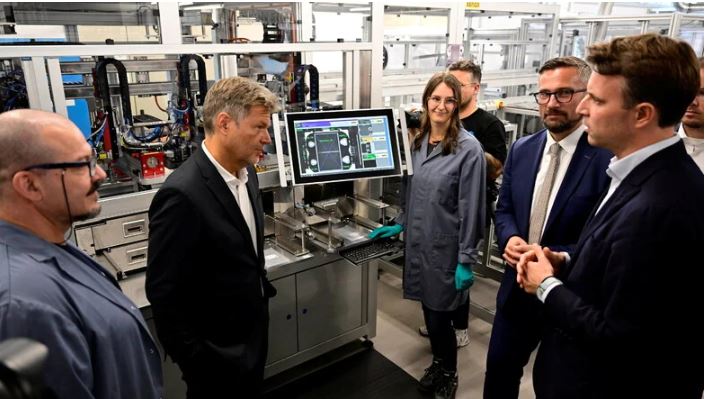Von Nora Miethke
Die Energiewende ist nicht gescheitert, wie Sachsens Ministerpräsident Michael Kretschmer in diesen Tagen wiederholt behauptet. Im Gegenteil, sie wird von Dresden aus vorangetrieben. Um das zu zeigen, eilte Bundeswirtschaftsminister Robert Habeck am Mittwoch nach der Kabinettsklausur in Meseberg direkt in die sächsische Landeshauptstadt. Dort überreichte er gemeinsam mit Sachsens Wirtschaftsminister Martin Dulig einen Förderbescheid über rund 162 Millionen Euro an die Sunfire GmbH.
Die Firma will in Sachsen die industrielle Fertigung von Elektrolyseuren aufbauen, sowohl für die Druck Alkali- als auch für die Hochtemperatur-Technologie. Elektrolyseure sind technische Vorrichtungen, mit denen in großen Mengen Wasserstoff aus erneuerbarem Strom erzeugt wird. Große Stahlwerke und Chemieunternehmen sind zum Beispiel auf grünen Wasserstoff angewiesen, wenn sie den Wandel zu klimaneutraler Produktion bis 2045 schaffen wollen.
„Wir müssen den Ausbau der erneuerbaren Energien mit industrieller Wertschöpfung verbinden. Dafür ist Sunfire ein leuchtendes Beispiel“, betonte Habeck. Das Unternehmen startete vor 13 Jahren als kleines Start-up und ist heute der führende mittelständische Hersteller von Elektrolyseuren, der jetzt in Sachsen über 255 Millionen Euro in eine Produktionslandschaft investiert.
30 Prozent der Fördersumme trägt der Freistaat Sachsen. Eine weitere Produktion für alkalische Elektrolyseure soll in Nordrhein-Westfalen (NRW) errichtet werden, gefördert mit sieben Millionen Euro. Insgesamt investiert Sunfire rund 400 Millionen Euro in Sachsen und NRW, davon 169 Millionen Euro durch Fördermittel.
Die Serienfertigung für die Alkali-Elektrolyseure wird bei Vitesco Technologies in Limbach-Oberfrohna errichtet. „Wir wollen zeigen, wie man die Kompetenzen aus einer alten Technologie wie dem Automobilbau nutzen kann, um mit einer neuen Technologie einen Markt zu erobern“, betonte Sunfire-Vorstandschef Nils Aldag. Ob mit der Fertigung zusätzliche Arbeitsplätze verbunden sind, wollte der Autozulieferer Vitesco am Mittwoch nicht sagen.
Am Firmensitz in Dresden entsteht das Forschungs- und Entwicklungszentrum sowie die Prototypen-Fertigung inklusive Testhalle für beide Technologien. Die Zahl der derzeit 400 Beschäftigten in Dresden soll sich in den kommenden Jahren nahezu verdoppeln.
Spitzenposition im harten Wettbewerb möglich
Sunfire wird als einziger deutscher Produzent von großskaligen Elektrolyseuren im Rahmen der europäischen Förderinitiative „IPCEI Wasserstoff“ unterstützt. Damit werden Großvorhaben von überragendem europäischen Interesse gefördert. „Dank der Zuwendung können wir dabei schneller und deutlich umfangreicher vorgehen als es uns mit eigenen Mitteln möglich wäre. IPCEI ist unser Katalysator auf dem Weg in die Gigawatt-Fertigung“, so Aldag und verspricht: „Wir werden das Vertrauen, das die Politik mit dieser umfangreichen Förderung in uns setzt, zurückzahlen.“
Der begeisterte Hobby-Rennradfahrer vergleicht den Aufbau der Fertigung mit einem „Sprint auf den Gipfel“. Bis 2030 will die EU eine grüne Wasserstoffleistung von 200 Gigawatt in Europa installiert haben. Das entspricht laut Aldag der Leistung von 200 großen Atomkraftwerken.
Zum Vergleich: Sunfire baut jetzt Fabriken auf, die Produktionskapazitäten von 500 Megawatt pro Jahr (Hochtemperatur-Technologie) und ein Gigawatt pro Jahr (Alkali) bereitstellen sollen. Im harten Wettbewerb mit den USA und China um den internationalen Elektrolysemarkt könne es Deutschland an die Spitze schaffen, ist der Firmenchef überzeugt. „Aber um diese Jahrhundertchance ergreifen zu können, brauchen wir einen Kickstart“ – die IPCEI-Förderung.
Es gäbe gute und schlechte Subventionen, so Habeck. Schlechte Subventionen seien die, die man zahlt, weil andere es auch tun. Gute Subventionen seien die, mit denen man unternehmerischen Wagemut unterstützt. „Das ist bei Sunfire der Fall. Sie haben früh erkannt, dass die Herstellung von grünem Wasserstoff ein neues Marktfeld wird“, lobte der Grünen-Politiker, der sichtlich Freude an dem Termin hatte. Auch für Fotos mit den Mitarbeitern und Mitarbeiterinnen nahm er sich Zeit. Und auch Martin Dulig freute sich: „Das Wasserstoffzeitalter nimmt von Sachsen aus weiter Fahrt auf.“
Der IPCEI-Prozess ist langwierig und bürokratisch. Die Vorhaben wurden schon im Mai 2021 ausgewählt. Um keine Zeit zu verlieren, hatte das BMWK bereits im Sommer vergangenen Jahres Sunfire den vorzeitigen Maßnahmenbeginn gewährt.
Die Dresdener tätigten daraufhin auf eigenes Risiko Investitionen – vornehmlich im Bereich der Druck-Alkali-Technologie, die bereits heute bei Kunden wie RWE und Uniper installiert wird. Während Sunfire den Start in die Serienfertigung dieser Technologie bereits im März 2023 feierte, wird im nächsten Schritt die industrielle Fertigung der innovativen Hochtemperatur-Elektrolyseure an Fahrt aufnehmen, die besonders hohe Wirkungsgrade erzielen.
Eine Pilotanlage steht bei der Salzgitter AG. „80 Prozent Wirkungsgrad. Das ist Weltrekord“, freute sich Vorstandschef Gunnar Groebler vor einer Woche auf dem TenneT-Netzgipfel in Lehrte. Der Stromnetzbetreiber schließt das Stahlwerk in Salzgitter an eine 380 KV-Höchstspannungsleitung an, damit der Sunfire-Elektrolyseur direkt mit grünem Strom versorgt werden kann.
„Wir wollen nicht in den Deindustrialisierungblues dieser Tage einstimmen. Sunfire steht für German Optimism, nicht für German Angst“, betonte Aldag. Der Bundeswirtschaftsminister schmunzelte erleichtert und wünschte zum Abschied: „Macht was draus, gewinnt die Bergetappe“.








